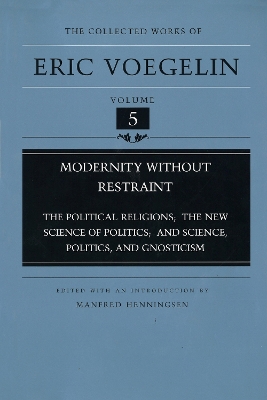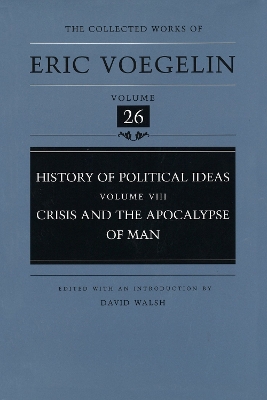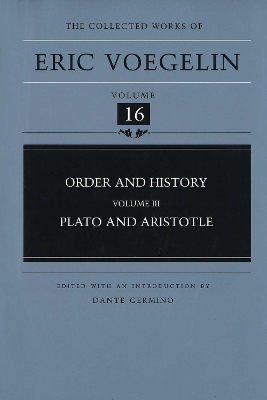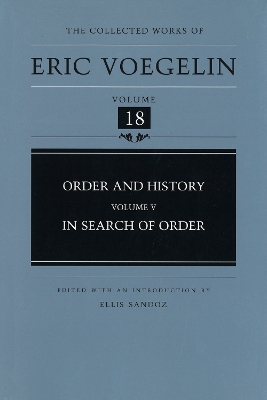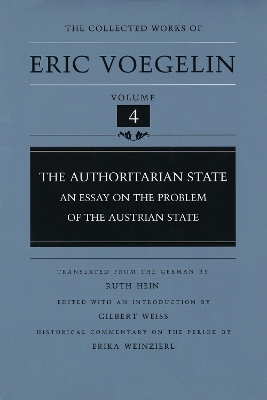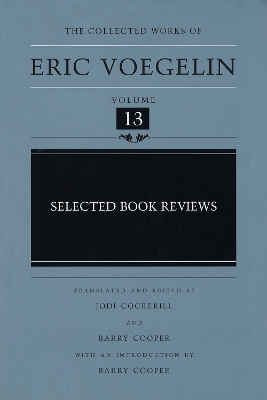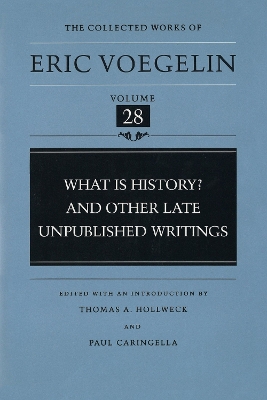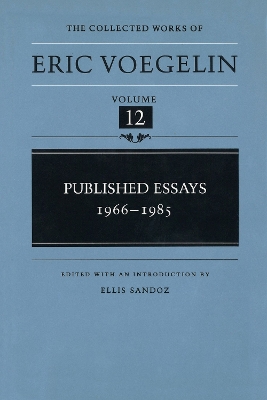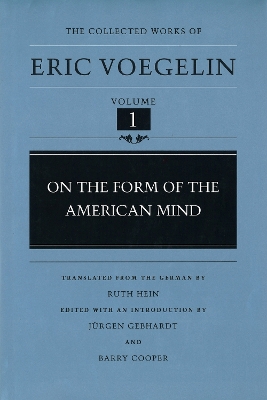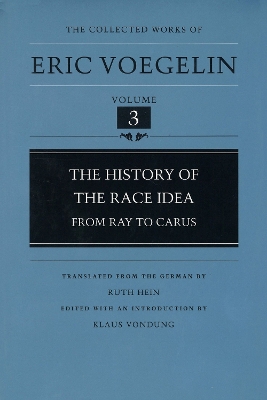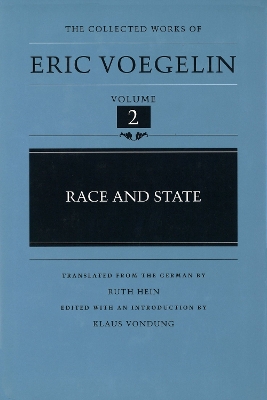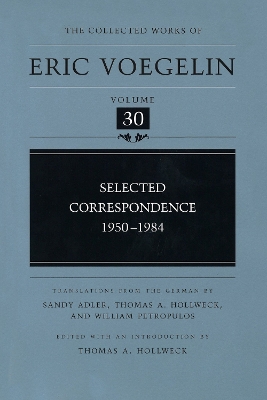Collected Works of Eric Voegelin
32 total works
Reaching into our own time, Crisis and the Apocalypse of Man confronts the disintegration of traditional sources of meaning and the correlative attempt to generate new sources of order from within the self. Voegelin allows us to contemplate the crisis in its starkest terms as the apocalypse of man that now seeks to replace the apocalypse of God. The totalitarian upheaval that convulsed Voegelin's world, and whose aftermath still defines ours, is only the external manifestation of an inner spiritual turmoil. Its roots have been probed throughout the eight volumes of History of Political Ideas, but its emergence is marked by the age of Enlightenment.
In our postmodern era, discussions of the collapse of the "enlightenment project" have become commonplace. Voegelin compels us to follow the great-souled individuals who sought to go from disintegration of the present toward evocations of order for the future. Such thinkers as Comte, Bakunin, and Marx suffered through the crisis and fully understood the need for a new outpouring of the spirit. They resolved to supply the deficiency themselves. As a consequence they launched us irrevocably on the path of the apocalypse of man.
One of the great merits of Voegelin's analysis is his exposition of the pervasive character of this crisis. It is not confined to the megalomaniacal dreamers of a revolutionary apocalypse; rather, echoes of it are found in the more moderate Enlightenment preoccupation with progress to be attained through application of the scientific method. Faith in the capacity of instrumental reason to answer the ultimate questions of human existence defined men such as Voltaire, Helvetius, Diderot, D'Alembert, and Condorcet. It remains the authoritative faith of our world today, Voegelin argues, demonstrated by our continuing inability to step outside the parameters of the Enlightenment. Are we condemned, then, to oscillate between the rational incoherence of a science that never delivers on its promises and a now discredited revolutionary idealism that wreaks havoc in practice? This is the question toward which Voegelin's final volume points. While not direct, his response is evident everywhere. Crisis and the Apocalypse of Man could have been written only by a man who had reached his own resolution of the crisis.
Through an absorbing analysis of the Platonic and Aristotelian vision of soul, polis, and cosmos, Voegelin demonstrates how the symbolic framework of the older myth was superseded by the more precisely differentiated symbols of philosophy. Although this outmoding and rejection of past symbols of truth might seem to lead to a chaotic and despairing relativism, Voegelin makes it the basis of a profound conception of the historical process: "the attempts to find the symbolic forms that will adequately express the meaning [of a society], while imperfect, do not form a senseless series of failures. For the great societies have created a sequence of orders, intelligibly connected with one another as advances toward, or recessions from, an adequate symbolization of the truth concerning the order of being of which the order of society is a part."
In this view, history has no obvious "meaning," yet each society makes a similar venture after truth. Although every society works out its destiny under different conditions, each nonetheless creates symbols"in its deeds and institutions"which bear the meaning of its own existence. History, then, acquires a unity in the common endeavor toward meaning and order. The rationality and nobility of this view of history has much to say to the present age.
Dante Germino's powerful introduction to this edition of Plato and Aristotle eloquently directs the reader into Voegelin's search through the thought of Plato foremost and Aristotle secondarily and toward a full understanding of their relevance to the "modern" world. This masterpiece, Germino argues, provides a welcome antidote to the spirit of an era Voegelin once called the Gnostic age.
This final volume of Order and History is devoted to the elucidation of the experience of transcendence that Voegelin discussed in earlier volumes. He aspires to show in a theoretically acute manner the exact nature of transcendental experiences. Voegelin's philosophical inquiry unfolds in the historical context of the great symbolic enterprise of restating man's humanity under the horizon of the modern sciences and in resistance to the manifold forces of our age that deform human existence. His stature as one of the major philosophical forces of the twentieth century clearly emerges from these concluding pages. In Search of Order deepens and clarifies the meditative movement that Voegelin, now in reflective distance to his own work, sees as having been operative throughout his search.
Because of Voegelin's death, on January 19, 1985, In Search of Order is briefer than it otherwise might have been; however, the theoretical presentation that he had set for himself is essentially completed here. Just as this volume serves Voegelin well in his striking analyses of Hegel, Hesiod, and Plato, it will serve as a model for the reader's own efforts in search of order.
Published in Vienna in 1936, The Authoritarian State by Eric Voegelin has remained virtually unknown to the public until now. Sales of the German edition were halted following the Nazi invasion of Austria in 1938, and the entire printing was later destroyed by wartime bombing. In this volume, Voegelin offers a critical examination of the most prominent European theories of state and constitutional law of the period while providing a political and historical analysis of the Austrian situation. He discusses the dismissal of Parliament in 1933, the civil war, the murder of Federal Chancellor Dollfuss, the adoption of the "Authoritarian Constitution" of 1934, and the predicament of being sandwiched between Hitler and Mussolini.
A radical critique of Hans Kelsen's pure theory of law lies at the heart of this work, marking Voegelin's definitive departure from Neo-Kantian epistemology. For the first time, Voegelin elaborates on the important distinction between theoretical concepts and political symbols as a basis for explaining the nontheoretical and speculative character of ideologies, both left and right. He shows that total and authoritarian are symbols of ideological self-interpretation that have no theoretical value, a distinction basic to his later work in The New Science of Politics.
Available for the first time in English, The Authoritarian State is a valuable addition to the Voegelin canon and to the field of intellectual history in general.
What is History? and Other Late Unpublished Writings (CW28)
by Eric Voegelin
In What Is History? Voegelin considers the development of a transcendent structure of history while simultaneously rejecting the notion that history can have a universal meaning. "Anxiety and Reason" focuses on Voegelin's critically important theory of historiogenesis, which links events in pragmatic history with legendary and mythical events leading back to the beginning of the cosmic order. In "The Eclipse of Reality," Voegelin presents a critique of modernity by analyzing the work of Sartre, Schiller, Comte, and others. "The Moving Soul"—a "thought experiment" inspired by a remark Henry Margenau makes in The Nature of Physical Reality—attempts to reformulate the connections between physics and myth. The most important of these essays is "Me Beginning and the Beyond." Here Voegelin meditates on the universality of experience formed by the tension of existence under God.
Publication of these previously unpublished writings will enable scholars to trace the genesis of many of the concerns that occupied Voegelin during a period in which the conception of his main work was undergoing frequent and perhaps fundamental changes.
Voegelin was an essayist at heart, and the pieces gathered here bear on almost every aspect of his philosophy. They range in subject matter and tone from a scalding critique of the German intellectual establishment during the Hitler period and a satire upon contemporary vulgarian culture to magisterial analyses of immortality, reason, and consciousness. The essays also embrace Voegelin's elaboration of the theory of equivalent experiences and symbolizations over human history and his meditation upon the lure of extremes in the rebellion of magic against reason in various modernist attacks on culture. The scope of Voegelin's work is magnified by the collection's final essay, a touching and profound deathbed reflection on God.
Running through all the material is Voegelin's conviction that the truly scientific or philosophical life is ordered through an Anselmian fides quaerens intellectum, a faith in search of understanding. Thus, the assertion that "all men by nature desire to know," which opens Aristotle's Metaphysics, is rightly completed by the words the divine Ground of being. It is the search of the Ground by a mystic philosopher-consciously indebted to such great contemplatives as Plato, Anselm, of Canterbury, jean Bodin, and Henri Bergson-that distinguishes Voegelin's own pilgrimage through time in partnership with God. Nowhere does this come more powerfully and luminously clear than in the pages of Published Essays, 1966-1985.
In 1924, not quite two years after receiving his doctorate from the University of Vienna, Eric Voegelin was named a Laura Spelman Rockefeller Memorial Fellow and thus given the opportunity to pursue postdoctoral studies in the United States. For the next twenty-four months, Voegelin worked with some of the most creative scholars in America and at several of the country's great universities, an experience that undoubtedly influenced his scholarly and personal perspectives throughout his life. A more immediate result was the publication in 1928 of On the Form of the American Mind, the young philosopher's first major work, in which his acute perceptions and analyses combine with a conceptual vocabulary struggling to find its own coherence and form.
Voegelin begins his inquiry into the form of the American mind with a complex discussion of the concepts of time and existence in European and American philosophy and continues with an extended interpretation of George Santayana, a study of the Puritan mystic Jonathan Edwards, a presentation on Anglo-American jurisprudence, and a consideration of the historian, economist, and political scientist John R. Commons (Voegelin was particularly interested in Commons' views on the mental, political, social, and economic aspects of democracy in modern urban and industrial America). Although admitting that this diversity of themes seems only loosely connected," Voegelin demonstrates the actual overall unity of these various subjects: each concerns linguistic expressions of a theoretical nature.Analysis of On the Form of the American Mind indicates that Voegelin integrated the approaches of Lebensphilosophie into what Georg Misch called the "philosophical combination of anthropology and history," which characterized contemporary trends within the discourse of the Geisteswissenschaften and finally resulted in a theoretical paradigm of philosophical anthropology.
Jurgen Gebhardt and Barry Cooper provide access to this brilliant study with their two-part introduction. The first part considers On the Form of the American Mind in the context of methodological debates ongoing in Germany at the time Voegelin was writing the book; the second describes Voegelin's American experience and compares his work with similar studies written during the post-World War I period.
Part I covers the development of race theories from the English naturalist John Ray to Blumenbach and Kant. Voegelin, anticipating fairly recent genetic insights, explains that human beings must be seen as one species, different races must not be interpreted as emerging from separate species. In Part II, Voegelin discusses the evolution of the concepts of the body, the organism, and the person. The finite image of the person as a body-mind unit in which body is equal to mind in value provides the basis for Carl Gustav Carus' theory of race, the first significant racial ideology, in Voegelin's estimation.
Voegelin's complex analysis levels a scathing critique at Nazi pretensions. He writes: "Compared to its classical form, the current condition of race theory is one of decay. . . . [T]hese men, with no eyes for the brilliance of the German spirit, want to interfere in human relations and ultimately presume to explicate the German nation to us and to the world--an undertaking with evil consequences. . . . [The] great thinkers of the past would have been horrified at somebody finding in himself all the traits of the Nordic race with the help of a book on anthropology and then imagining himself to be somebody special who does not have to do anything else.
"Let us now take a look at contemporary race theory--we will see an image of destruction. . . . It is a nightmare to think that we should recognize the people whom we follow and whom we allow to come near us not by their looks, their words, and their gestures, but by their cranial index." Ultimately, Voegelin dismisses any attempt to reduce the human being—his existence, appearance, or actionsto a lower level: "Man as mind-body and historical substance cannot be explained' by an element that is less than man himself.
In Part I Voegelin analyzes contemporary race theories by placing the question of race in the context of the more comprehensive philoiophical problem of the interrelationships of body, mind, and soul. He demonstrates the intellectual shortcomings and theoretical fallacies of current theories; more important, he contributes to the development of a modern philosophical anthropology that aims, as Helmuth Plessner put it in a review of Race and State, "at a concept of the human being that does justice to its multilayered existence as a physical, vital, psychic, and intellectual being, without making one of these layers the measure and explanatory basis for the others."
In Part II Voegelin deals with race ideas, which he distinguishes from race theories. Race ideas, like other political ideas, form a part of political reality itself, contributing to the formation of social groups and societies. Voegelin shows that the modern race idea is just one "body ideal" among others, such as the tribal state and the Kingdom of Christ, each offering a different symbolic image of community. He traces the rise of the modem race idea, analyzes its function to structure community, and offers an answer to the question of why race ideas became successful in Germany.
Voegelin's meticulous sifting of all the Nazi race literature finally arrives at this blunt statement regarding its overall validity: "In order to preclude even the slightest possibility of a misunderstanding, let us again point out emphatically that the contrasting descriptions of the Semitic and the Aryan, the Jewish and the German character . . . contain little that is true about the nature of Jewishness.
